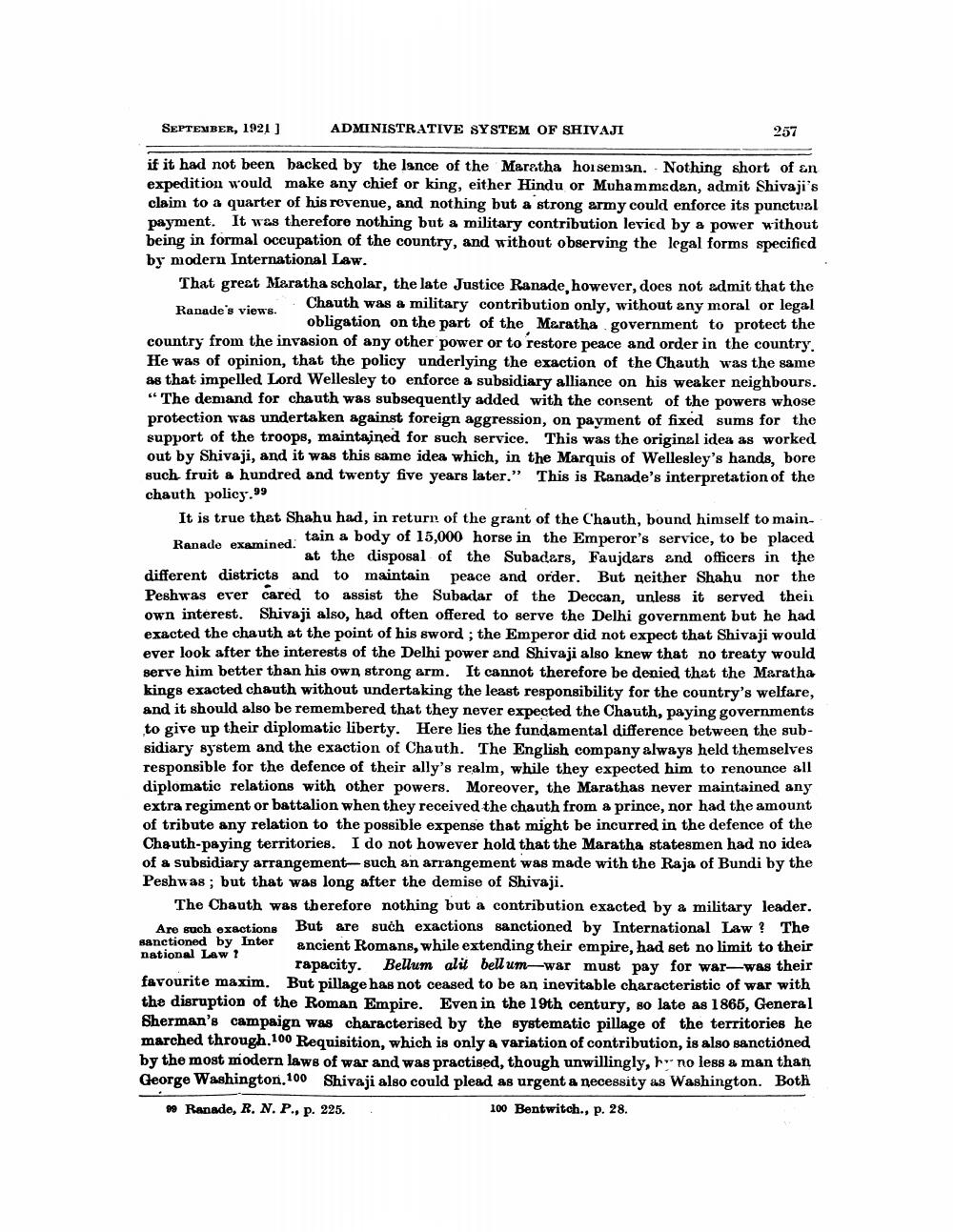________________
SEPTEMBER, 1921 ]
ADMINISTRATIVE SYSTEM OF SHIVAJI
257
if it had not been backed by the lance of the Maratha horseman. Nothing short of an expedition would make any chief or king, either Hindu or Muhammaden, admit Shivaji's claim to a quarter of his revenue, and nothing but a strong army could enforce its punctual payment. It was therefore nothing but a military contribution levied by a power without being in formal occupation of the country, and without observing the legal forms specified by modern International Law. That great Maratha scholar, the late Justice Ranade, however, does not admit that the
Chauth was a military contribution only, without any moral or legal
obligation on the part of the Maratha government to protect the country from the invasion of any other power or to restore peace and order in the country. He was of opinion, that the policy underlying the exaction of the Chauth was the same as that impelled Lord Wellesley to enforce a subsidiary alliance on his weaker neighbours. “The demand for chauth was subsequently added with the consent of the powers whose protection was undertaken against foreign aggression, on payment of fixed sums for the support of the troops, maintained for such service. This was the original idea as worked out by Shivaji, and it was this same idea which, in the Marquis of Wellesley's hands, bore such fruit a hundred and twenty five years later." This is Ranade's interpretation of the chauth policy." It is true that Shahu had, in return of the grant of the Chauth, bound himself to main
tain & body of 15,000 horse in the Emperor's service, to be placed
at the disposal of the Subaders, Faujders and officers in the different districts and to maintain peace and order. But neither Shahu nor the Peshwas ever cared to assist the Subadar of the Deccan, unless it served their own interest. Shivaji also, had often offered to serve the Delhi government but he had exacted the chauth at the point of his sword; the Emperor did not expect that Shivaji would ever look after the interests of the Delhi power and Shivaji also knew that no treaty would serve him better than his own strong arm. It cannot therefore be denied that the Maratha kings exacted chauth without undertaking the least responsibility for the country's welfare, and it should also be remembered that they never expected the Chauth, paying governments to give up their diplomatic liberty. Here lies the fundamental difference between the subsidiary system and the exaction of Chauth. The English company always held themselves responsible for the defence of their ally's realm, while they expected him to renounce all diplomatic relations with other powers. Moreover, the Marathas never maintained any extra regiment or battalion when they received the chauth from a prince, nor had the amount of tribute any relation to the possible expense that might be incurred in the defence of the Chauth-paying territories. I do not however hold that the Maratha statesmen had no idea of a subsidiary arrangement-such an arrangement was made with the Raja of Bundi by the Peshwas; but that was long after the demise of Shivaji.
The Chauth was therefore nothing but a contribution exacted by a military leader. Are such exactione But are such exactions sanctioned by International Law ? The sanctioned by Inter ancient Romans, while extending their empire, had set no limit to their national Law 1
rapacity. Bellum alit bellum-war must pay for war-was their favourite maxim. But pillage has not ceased to be an inevitable characteristic of war with the disruption of the Roman Empire. Even in the 19th century, so late as 1865, General Sherman's campaign was characterised by the systematic pillage of the territories he marched through.100 Requisition, which is only a variation of contribution, is also sanctioned by the most modern laws of war and was practised, though unwillingly, hy no less & man than George Washington, 100 Shivaji also could plead as urgent a necessity as Washington. Both 9 Ranade, R. N. P., p. 225.
100 Bentwitch., p. 28.




